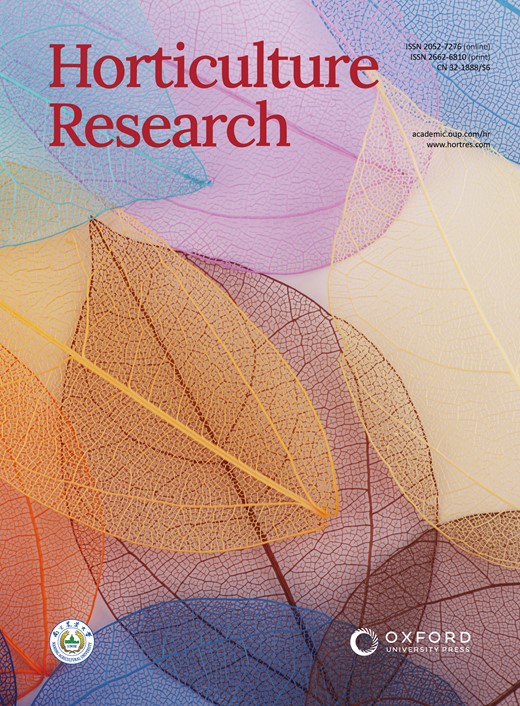A low-cost dpMIG-seq method for elucidating complex inheritance in polysomic crops: A case study in tetraploid blueberry
IF 8.7
1区 农林科学
Q1 Agricultural and Biological Sciences
引用次数: 0
Abstract
Next-generation sequencing (NGS) library construction often requires high-quality DNA extraction, precise adjustment of DNA concentration, and restriction enzyme digestion to reduce genome complexity, which results in increased time and cost in sample preparation and processing. To address these challenges, a PCR-based method for rapid NGS library preparation, named dpMIG-seq, has been developed and proven effective for high-throughput genotyping. However, the application of dpMIG-seq has been limited to diploid and polyploid species with disomic inheritance. In this study, we obtained genome-wide single nucleotide polymorphism (SNP) markers for tetraploid blueberry to evaluate genotyping and downstream analysis outcomes. Comparison of genotyping qualities inferred across samples with different DNA concentrations and multiple bioinformatics approaches revealed high accuracy and reproducibility of dpMIG-seq-based genotyping, with Pearson’s correlation coefficients between replicates in the range of 0.91 to 0.98. Furthermore, we demonstrated that dpMIG-seq enables accurate genotyping of samples with low DNA concentrations. Subsequently, we applied dpMIG-seq to a tetraploid F1 population to examine the inheritance probability of parental alleles. Pairing configuration analysis supported the random meiotic pairing of homologous chromosomes on a genome-wide level. On the other hand, preferential pairing was observed on chr-11, suggesting that there may be an exception to the random pairing. Genotypic data suggested quadrivalent formation within the population, although the frequency of quadrivalent formation varied by chromosome and cultivar. Collectively, the results confirmed applicability of dpMIG-seq for allele dosage genotyping and are expected to catalyze the adoption of this cost-effective and rapid genotyping technology in polyploid studies.用于阐明多倍体作物复杂遗传的低成本 dpMIG-seq 方法:四倍体蓝莓的案例研究
下一代测序(NGS)文库的构建通常需要高质量的 DNA 提取、精确的 DNA 浓度调整和限制性酶消化以降低基因组的复杂性,这就增加了样品制备和处理的时间和成本。为了应对这些挑战,一种基于 PCR 的快速 NGS 文库制备方法(名为 dpMIG-seq)已被开发出来,并被证明对高通量基因分型有效。然而,dpMIG-seq 的应用仅限于二倍体和多倍体物种,而且是非组遗传。在本研究中,我们获得了四倍体蓝莓的全基因组单核苷酸多态性(SNP)标记,以评估基因分型和下游分析结果。通过比较不同DNA浓度样本和多种生物信息学方法推断出的基因分型质量,发现基于dpMIG-seq的基因分型具有很高的准确性和可重复性,重复样本之间的皮尔逊相关系数在0.91至0.98之间。此外,我们还证明了 dpMIG-seq 能够对 DNA 浓度较低的样本进行准确的基因分型。随后,我们将 dpMIG-seq 应用于四倍体 F1 群体,研究亲本等位基因的遗传概率。配对构型分析支持同源染色体在全基因组水平上的随机减数分裂配对。另一方面,在 chr-11 上观察到了优先配对,这表明随机配对可能存在例外。基因型数据表明,虽然四价形成的频率因染色体和栽培品种而异,但在种群中仍有四价形成。总之,这些结果证实了 dpMIG-seq 在等位基因剂量基因分型方面的适用性,并有望促进这种经济高效的快速基因分型技术在多倍体研究中的应用。
本文章由计算机程序翻译,如有差异,请以英文原文为准。
求助全文
约1分钟内获得全文
求助全文
来源期刊

Horticulture Research
Biochemistry, Genetics and Molecular Biology-Biochemistry
CiteScore
11.20
自引率
6.90%
发文量
367
审稿时长
20 weeks
期刊介绍:
Horticulture Research, an open access journal affiliated with Nanjing Agricultural University, has achieved the prestigious ranking of number one in the Horticulture category of the Journal Citation Reports ™ from Clarivate, 2022. As a leading publication in the field, the journal is dedicated to disseminating original research articles, comprehensive reviews, insightful perspectives, thought-provoking comments, and valuable correspondence articles and letters to the editor. Its scope encompasses all vital aspects of horticultural plants and disciplines, such as biotechnology, breeding, cellular and molecular biology, evolution, genetics, inter-species interactions, physiology, and the origination and domestication of crops.
 求助内容:
求助内容: 应助结果提醒方式:
应助结果提醒方式:


